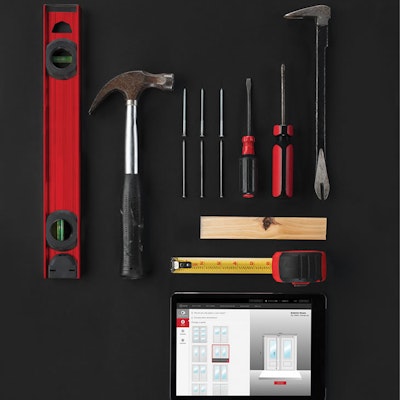Unlocking Profit Potential through Contractors
Manufacturers have many hidden assets of real value to contractors, both large and small. Learn how to leverage your resources to get contractors on your side.

If you want to sell more products that require an experienced installer, you need to know how to sell contractors. Consumers are looking to contractors for even seemingly DIY projects, as they now value their time more than ever. For many projects, such as roofing, the contractor is the gatekeeper who decides what brand to install.
If he’s doing his job right, the first thing the contractor does is establish trust with the homeowner. Then if the consumer requests a specific brand, the contractor can easily move them to the brand he prefers.
Contractors come large and small, and each type needs to be approached differently. In a few categories, manufacturers sell directly to the large contractors. The majority of the time, though, they sell through distributors, dealers or retailers that in turn sell to contractors — usually the smaller ones.

To become more successful with contractors than your competition, you must step beyond product, price and service. Instead, help them identify and overcome their barriers to success. Stop selling to them and sell through them by helping them sell more of your products.
know the contractor’s needs
The needs of large contractors are different than those of small ones. These go beyond product, price and service. The manufacturer who meets these “other” needs benefits in two ways:
- Increased loyalty from the contractor, who is now more concerned with success than price.
- By providing programs that focus on increasing sales, you help participating contractors sell more jobs than those who use another brand.
Small contractors have lower overhead and are likely to underprice a job. Thus, large contractors need to differentiate themselves from the smaller guys to show why they are worth the higher cost.
find your hidden value
Product manufacturers can help larger contractors by allowing them to be associated with their brand name. The strongest of these programs have an exclusive element to them, such as a “Preferred Contractor” program. The requirements for these programs are usually designed to make it easier for a larger, more established contractor to qualify. Typical requirements include a certain length of time in business, Better Business Bureau membership, insurance and a documented training program.
Product manufacturers have many hidden assets that can surprisingly have real value to contractors. For example, when business is good, one of the large contractor’s biggest needs is finding and keeping qualified people. The HR department of many manufacturers can provide valuable advice to help contractors hire and retain great people. The large contractor is also more concerned with productivity. Many manufacturers have specialists in this area who can help meet these needs.
If one contractor has a need, chances are it’s shared by many. If manufacturers can’t meet that particular need with internal resources, they can usually hire someone to develop a solution or recommendation at a cost that a single contractor couldn’t afford. An example is succession planning. Many contracting firms are family-owned and face the unique challenges of running a family business — including succession planning.

cater differently to small contractors
Small contractors’ primary need is simply knowing how to stay in business. Most of them are installers at heart. They often started by working for someone else and learned to do their jobs extremely well. They were probably one of the best and eventually felt unappreciated by their boss or just thought they could run things better themselves. While they love to install and are probably very good at it, they must have a much broader skillset to be a successful small business owner.
They have to be good at sales, finance, marketing, human resources, customer service and more. To learn more about the challenges of a typical small contractor, consider reading The E-Myth by Michael Gerber. It offers many insights on how to approach the problems of a small business. It also makes a great gift to anyone running a small business you’d like to help. This can help demonstrate your commitment to helping them grow.
guide small contractors to success
You can’t just give contractors marketing tools, like ads or mailers, and walk away. Giving them tools without guidance is probably more harmful than helpful, because they might spend money incorrectly and achieve little or no results.
The most important way you can help small contractors is by teaching them the importance of a healthy profit margin. They will commonly underprice projects for fear of losing the job. This can be as simple as a demonstration using their numbers. For example, a contractor may be able to raise prices by 10 percent and make more profit with 25 percent fewer jobs, but they won’t believe it until you show them.

how to reach contractors
Even if you can develop programs to help small contractors, they are difficult to reach. If you go to a Lowe’s or Home Depot parking lot at 7 a.m. on a weekday, you’ll see the smallest contractors picking up materials for that day’s job. They’ll usually have a pickup truck without any signage. They may not even have a business card, phone listing or website. They rely on word of mouth. Lowe’s and Home Depot value these people and want more of their business.
If you reach contractors through big box retailers, you can develop programs that meet their needs, then offer them jointly through Lowe’s or Home Depot. Your program can be a simple handout, a seminar or access to a website that provides the help they need. It shows how much you value them because you are helping improve their business. You can reach them through lumberyards using these same techniques.
If you sell them through distributors, you may be able to utilize the distributor sales reps to deliver your program. They also have special events for contractors you can use to reach them.
When you have new products that require a change in selling or installation methods, the small contractor will usually be an easier sell. The larger contractors become, the greater risk aversion they develop. They just don’t like change.
stop selling to contractors
To become more successful with contractors than your competition, you must step beyond product, price and service. Instead, help them identify and overcome their barriers to success. Stop selling to them and sell through them by helping them sell more of your products. By supporting them and helping them grow, you can create loyalty and develop long-term relationships. And remember, if they aren’t in business, they can’t sell more of your products.




